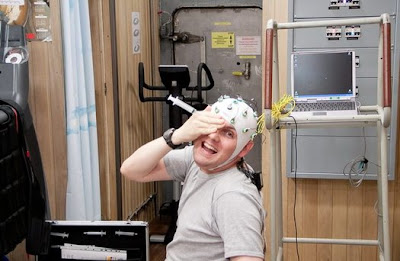The Mars500 experiment is cruising along nicely! On September 10th, French Astronomer and Graphic Designer Steve Légère presented a beautiful commemorative collage to the crew; many of us following the Mars500 closely added our names to the poster to congratulate all the Marsonauts on their 100th day. We were very gratified when the guys "inside" twittered their thanks for our support.
The ESA and Roskosmos were very happy yesterday, because the team officially reached Day #105 – matching the previous crew's duration. But me, I'm excited about TODAY! Day #106 makes the longest simulation ever completed by a Mars analog team. Now they just have to repeat this duration five more times...

Great job, Steve!
Live voice communications ceased on July 26th, leaving the men with a "time lag" for all audio and text transmissions. To make the simulation as real as possible, their com delays will always reflect where they are in space, on the way to Mars. Crew and mission controllers send messages to each other, but must now wait for replies, meaning no "real-time" communications – not even with family – and in any disaster scenarios, the crew must make crucial decisions for themselves. Simulated crises will test how they respond to emergency situations.

Needle humor. Getting punchy in there, guys?
Italian-Colombian Marsonaut Diego Urbina, worked in Operations at the European Astronaut Centre's Neutral Bouyancy Facility in Cologne, Germany before joining the Mars500 project, and when asked why he applied for the program, he replied, "Because this study... in isolation and reaction is not useful only for Mars, but also for life on Earth."
Unfortunately, 33 very isolated miners in Chile are discovering these phenomena right now, and under much tougher, less-controlled surroundings. While in isolation, you can become closely bonded to those around you, but it can also be a recipe for trouble and clique-behavior under stress, overwork or extreme environmental conditions. Studies and disasters, both voluntary and involuntary, teach us a great deal about human behavior.

Scratch that last question. We have our answer.
Very special thanks to the kind chaps on the Mars500 media team for granting permission to use some of their pictures on my blog for this Day #106 update! Большое спасибо!
Click here for my past posts on the Mars500, or here to join their Twitter feed or Facebook page. They also have an awesome YouTube Channel with a tour of the completed Mars ship facility.




